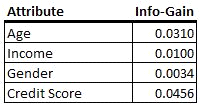Databricks Certified Professional Data Scientist Exam Questions
If you are looking to clear the Databricks Certified Professional Data Scientist exam on your first go, then you should study PassQuestion high-quality Databricks Certified Professional Data Scientist Exam Questions that will help you succeed in the exam. With the help of the Databricks Certified Professional Data Scientist Exam Questions provided by PassQuestion, you will be able to get complete technical assistance and guidelines for the preparation of Databricks Certified Professional Data Scientist exam so you can pass your exam on the first attempt.

Databricks Certified Professional Data Scientist Exam Description
The Databricks Certified Professional Data Scientist certification exam assesses the understanding of the basics of machine learning and the steps in the machine learning lifecycle, including data preparation, feature engineering, the training of models, model selection, interpreting models, and the production of models. The exam also assesses the understanding of basic machine learning algorithms and techniques, including linear regression, logistic regression, regularization, decision trees, tree-based ensembles, basic clustering algorithms, and matrix factorization techniques. The basics of model management with MLflow, like logging and model organization, are also assessed.
Prerequisites
The minimally qualified candidate should have:
a complete understanding of the basics of machine learning, including:
- bias-variance tradeoff
- in-sample vs. out-of sample data
- categories of machine learning
- applied statistics concepts
a intermediate understanding of the steps in the machine learning lifecycle, including:
- data preparation
- feature engineering
- model training, selection, and production
- interpreting models
a complete understanding of basic machine learning algorithms and techniques, including:
- linear, logistic, and regularized regression
- tree-based models like decision trees, random forest and gradient boosted trees
- unsupervised techniniques like K-means and PCA
- specific algorithms like ALS for recommendation and isolation forests for outlier detection
a complete understanding of the basics of machine learning model management like logging and model organization with MLflow
Exam Details
The exam consists of 60 multiple-choice questions.
Candidates will have 120 minutes to complete the exam.
The minimum passing score for the exam is 70 percent. This translates to correctly answering a minimum of 42 of the 60 questions.
The exam will be conducted via an online proctor.
This exam has no code-based questions, and there will be no test aids available while taking the exam.
View Online Databricks Certified Professional Data Scientist Free Questions
You are asked to create a model to predict the total number of monthly subscribers for a specific magazine. You are provided with 1 year's worth of subscription and payment data, user demographic data, and 10 years worth of content of the magazine (articles and pictures). Which algorithm is the most appropriate for building a predictive model for subscribers?
A.Linear regression
B.Logistic regression
C.Decision trees
D.TF-IDF
Answer : A
You are working in a data analytics company as a data scientist, you have been given a set of various types of Pizzas available across various premium food centers in a country. This data is given as numeric values like Calorie. Size, and Sale per day etc. You need to group all the pizzas with the similar properties, which of the following technique you would be using for that?
A.Association Rules
B.Naive Bayes Classifier
C.K-means Clustering
D.Linear Regression
E.Grouping
Answer : C
Which of the below best describe the Principal component analysis
A.Dimensionality reduction
B.Collaborative filtering
C.Classification
D.Regression
E.Clustering
Answer : A
You have collected the 100's of parameters about the 1000's of websites e.g. daily hits, average time on the websites, number of unique visitors, number of returning visitors etc. Now you have find the most important parameters which can best describe a website, so which of the following technique you will use
A.PCA (Principal component analysis)
B.Linear Regression
C.Logistic Regression
D.Clustering
Answer : A
Refer to the exhibit.

You are building a decision tree. In this exhibit, four variables are listed with their respective values of info-gain.
Based on this information, on which attribute would you expect the next split to be in the decision tree?
A.Credit Score
B.Age
C.Income
D.Gender
Answer : A
- TOP 50 Exam Questions
-
Exam
All copyrights reserved 2025 PassQuestion NETWORK CO.,LIMITED. All Rights Reserved.

